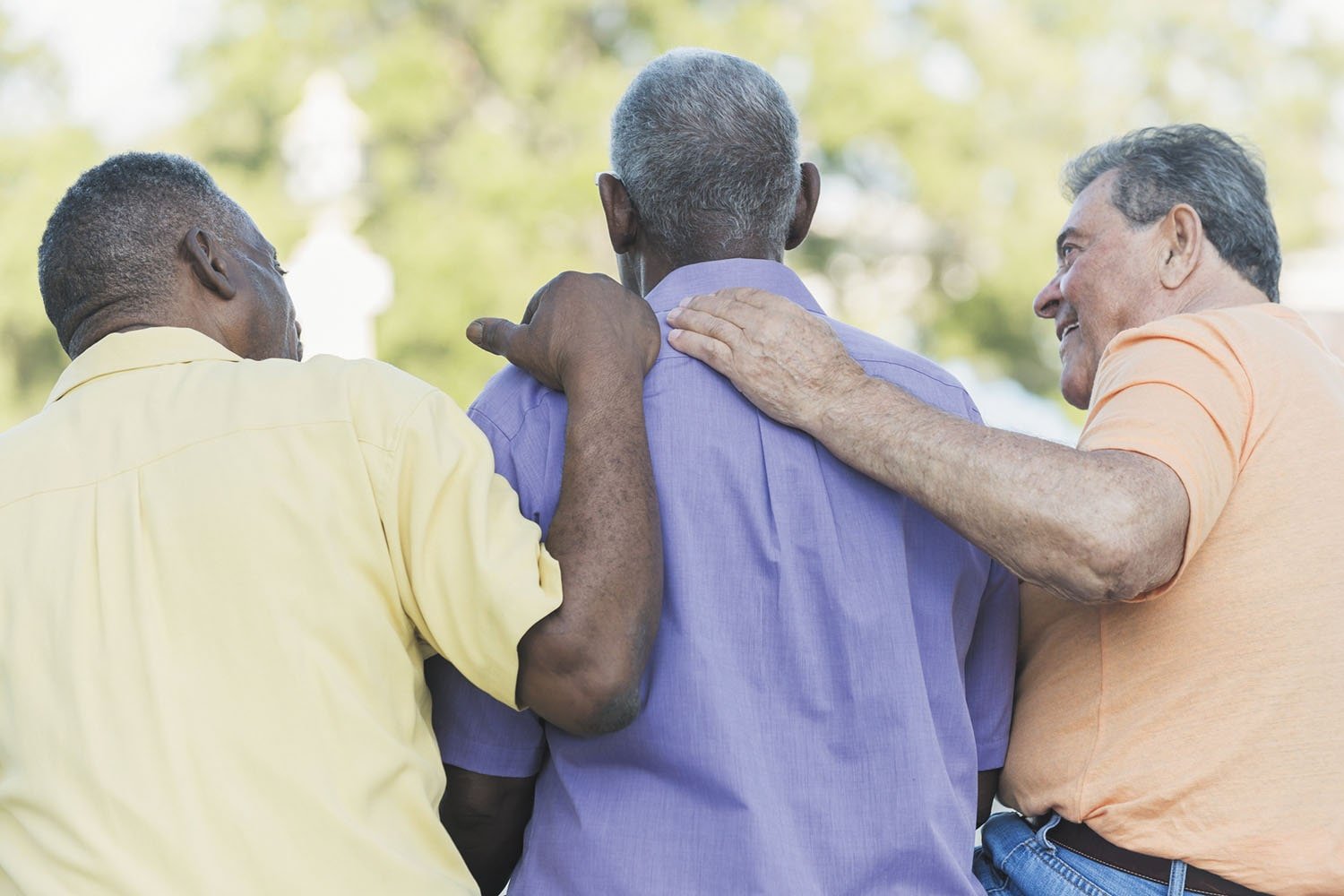Loss of Partner Community
Any loss of a person can be devastating, but losing a partner is one of the most overwhelming
This loss is crushing because of the way partners lives are intertwined, and the high level of dependence each might have on the other. In addition, grief may be further complicated if levels of unhappiness are high at the point of the death of one of the partners. In a healthy partner relationship, partners generally meet the majority of each other's basic emotional needs. When a partner dies the loss is excruciating and touches almost every area of daily life.



Following the loss of a partner, it is important to take good care of yourself in every way.
- Grief is exhausting and you will need to work hard to get plenty of quality sleep
- Eating healthy food will be a key, and simple exercise like walking combined with sunshine and fresh air will help you physically
- For your mental health you will need help with how to think about your loss. Tools are available to help you deal with recurring traumatic images
- Reflecting on the meaning and purpose of your loss will strengthen your spiritual life, and surrounding yourself with a few positive, loving people will provide much-needed support
- Your emotional battery will drain quickly so find ways to charge it regularly by treating yourself and remembering your own worth and value against the background of your loss
- Seek companionship in your grief and take every opportunity to talk about what you are experiencing with people you trust
We can connect you with others in your specific age group or season of life in our loss of partner community.
Community Connection
Grief doesn't simply go away... you need help.
- Connect with others who have experienced your same loss
- Interact through workshops on loss topics
- Find help through print resources you can view or download
Loss of Partner Community
Bringing grieving people together to heal.
We Grieve offers companionship and support for healthy healing through connection in loss communities, virtual workshops, and print resources.
Any loss of a person can be devastating, but losing a partner is one of the most overwhelming. This loss is crushing because of the way partners lives are intertwined, and the high level of dependence each might have on the other. In addition, grief may be further complicated if levels of unhappiness are high at the point of the death of one of the partners. In a healthy partner relationship, partners generally meet the majority of each other's basic emotional needs. When a partner dies the loss is excruciating and touches almost every area of daily life.
Common Reactions to Partner Loss
Shock
Whether or not the loss is sudden, and you are, or are not expecting it, the moment of death of a partner is a powerful blow. The pain is excruciating, but reality has not quite set in at first, because of the effects of shock. Reactions to emotional shock vary, but often a person will later be told of things they said and did in the hours surrounding the death and have no memory of it.
Much like the feeling of being punched in the stomach, the death of a partner can leave you breathless, unable to focus for more than a moment, and struggling to understand or even know what is happening to you. Feelings of denial or disbelief are strong with shock, and may return long after the initial loss as awareness of the reality begins to set in. While experiencing shock, it is important to lean on the presence of trusted friends and family for support.
Anger
Another common reaction to loss is an unwillingness to accept reality. You may find yourself protesting and overcome with strong overwhelming emotions. We all express our anger differently. Some carry it deep inside, the intensity hidden away from public view, while others explode eternally and leave no doubt how furious they are with losing their partner. Still others experience a sort of “low boil” just under the surface, stirring feelings of resentment, frustration and even hopelessness.
At times it is hard to know exactly what you are angry about, and at others the target is very specific. Commonly loss creates anger at a disease or healthcare organization or staff, or at a habit or addictive substance. Often there is even anger toward the partner you lost for something they did or were perceived to do or not do that led to their death. Your anger does need a target with a name and a reason for why you are feeling it to be able to work through it and release it. This is an arduous process and takes time, so be kind and loving to yourself as you experience these strong, overwhelming emotions. Taking life one day at a time is truly about all you can do when you lose a partner.
Disorganization
Following the loss, a general sense of disorganization replaces the common routines you might have been used to before losing your partner. Nothing seems to work the way it is supposed to. Tasks you could have done easily before now take twice as long and often are not even attempted. Projects are started but not completed, and you may feel very little energy for even the simplest of tasks. Grief is exhausting! You may feel as though you have run a marathon and have never left the house. Your partner’s share of chores and responsibilities are left undone and you either have to attempt them yourself or find someone you can ask to volunteer or pay for the service. All this wrapped up in just the sheer unbelief that you are now alone to figure it out yourself is overwhelming.
One of the most frustrating elements of your grief to those close to you is your desire to isolate and just be left alone. You may dread leaving the house or being forced to have conversations with people. Many fear interactions with people they know because they will be forced to answer the “How are you doing?” questions or explain what happened for the first time over and over, or cry in front of friends and neighbors at the grocery store. Loss of a partner creates an overall unhappiness with life and the looming fear that life will never be normal again. It is important to allow yourself to grieve the death of your partner. Feel the painful emotions, and then get out of bed, take a shower, put on clean clothes, and step into your day.
Reorganization
There is no timeline upon which grieving the loss of a partner operates. Grief comes in waves, not stages. This is somewhat encouraging because it means the pain will not be unrelenting forever. The time will come when you have better days, when there are fewer grief bursts, and the intensity of your emotion is not what it was in the beginning. You will discover you can do things you never thought you could do, and hopefully you will be surprised that from seemingly nowhere, people show up in your life with love and helpful support.
Learn to be grateful for these good days when you have a little more energy, or find yourself laughing at something funny, or choose to accept an invitation from a friend to do something interesting. They will come and go, but it is the goal of grief to honor the memory of your loved one, and accepting the reality of their death, adjust your life to the new reality of what life without your partner looks like.
New Life
Few people early in the pain of losing their partner appreciate the thought of a “new life”. What you want is your partner back, healthy and strong. The harsh aspect of reality is that bringing them back physically is not possible, so the choice must be to adjust to this new reality and find meaning and purpose in it. Acceptance does not require liking this new reality, but at first just allowing it to be. Feelings of loneliness and hopelessness are gradually replaced with a connection to others. You do not betray your beloved partner when you move forward. Your love for them is not proved by how long you suffer their loss. While your partner is no longer here, you are. And you can gradually reengage in life to live and love again.
There are many factors that will determine what your new normal will look like, and you do not have to know every detail of that picture right now. Do your best to refrain from creating rules about the future that you force yourself to live by that are based in the commitment you made to your partner before they died. As much as you wish they had never left, they are gone and the rest of your life is ahead of you. Take your time, explore the new identity you now have without your partner, and allow yourself to heal and grow healthy. You will always feel a sadness when you think of the person you lost, but you will feel normal again. You can do this. You will be happy again.
Helpful Resources for Partner Loss

We Grieve Workshops
Grief Workshops are open to all loss communities and are offered on a variety of topics.
Grief Workshops utilize a virtual platform and include teaching and small group, loss-specific breakouts with discussion enabled by a trained community facilitator. Workshops are scheduled for 90-minute sessions meeting weekly for four consecutive weeks.



Make a Donation
If the We Grieve Community experience has been valuable to you, give back.
Your donation will go to offset the cost of We Grieve, and allow us to continue offering free resources, workshops, and connection for grieving people.
Make a Donation



